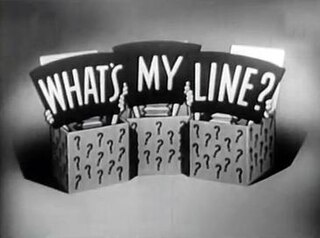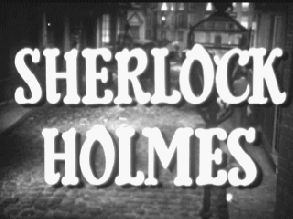Related Research Articles
Front Page Challenge was a Canadian panel game about current events and history. Created by comedy writer/performer John Aylesworth and produced and aired by CBC Television, the series ran from 1957 to 1995.

Edgar Montilion "Monty" Woolley was an American film and theater actor. At the age of 50, he achieved a measure of stardom for his role in the 1939 stage play The Man Who Came to Dinner and its 1942 film adaptation. His distinctive white beard was his trademark and he was affectionately known as "The Beard."

What's My Line? is a panel game show that originally ran in the United States, between 1950 and 1967, on CBS. The game show started in black and white and later in color, with subsequent U.S. revivals. The game uses celebrity panelists to question contestants in order to determine their occupation. The majority of the contestants were from the general public, but there was one weekly celebrity "mystery guest" for whom the panelists were blindfolded. It is on the list of longest-running U.S. primetime network television game-shows. Originally moderated by John Charles Daly and most frequently with regular panelists Dorothy Kilgallen, Arlene Francis, and Bennett Cerf, What's My Line? won three Emmy Awards for "Best Quiz or Audience Participation Show" in 1952, 1953, and 1958 and the Golden Globe Awards for Best TV Show in 1962.
Bennett Alfred Cerf was an American writer, publisher, and co-founder of the American publishing firm Random House. Cerf was also known for his own compilations of jokes and puns, for regular personal appearances lecturing across the United States, and for his weekly television appearances for over 17 years on the panel game show What's My Line?

The Red Skelton Show is an American television comedy/variety show that aired from 1951 to 1971. In the decade prior to hosting the show, Richard "Red" Skelton had a successful career as a radio and motion pictures star. Although his television series is largely associated with CBS, where it appeared for more than sixteen years, it actually began and ended on NBC. During its run, the program received three Emmy Awards, for Skelton as best comedian and the program as best comedy show during its initial season, and an award for comedy writing in 1961. In 1959 Skelton also received a Golden Globe for Best TV Show.
"Zip-a-Dee-Doo-Dah" is a song composed by Allie Wrubel with lyrics by Ray Gilbert for the Disney 1946 live action and animated movie Song of the South, sung by James Baskett. For "Zip-a-Dee-Doo-Dah", the film won the Academy Award for Best Original Song and was the second Disney song to win this award, after "When You Wish upon a Star" from Pinocchio (1940). In 2004, it finished at number 47 in AFI's 100 Years...100 Songs, a survey of top tunes in American cinema.

Sherlock Holmes is an American detective television series syndicated in the autumn of 1954, based on the Sherlock Holmes stories of Arthur Conan Doyle. The 39 half-hour mostly original stories were produced by Sheldon Reynolds and filmed in France by Guild Films, starring Ronald Howard as Holmes and H. Marion Crawford as Watson. Archie Duncan appeared in many episodes as Inspector Lestrade. Richard Larke, billed as Kenneth Richards, played Sgt. Wilkins in about fifteen episodes. The series' associate producer, Nicole Milinaire, was one of the first women to attain a senior production role in a television series.
The Armed Forces Hour is an American television program broadcast on NBC October 30, 1949 - June 11, 1950 and on the DuMont Television Network February 4, 1951 - May 6, 1951. Despite the title of the series, it was a half-hour program.
Americana is a weekly game show which ran on NBC from December 8, 1947, to July 4, 1949.

Star Time is an American variety series that aired on the DuMont Television Network from September 5, 1950, to February 27, 1951, and starred singer-actress Frances Langford. It was broadcast from 10 to 11 p.m. on Tuesdays.
The Ted Steele Show is the title of several television and radio programs that were hosted by bandleader Ted Steele (1917–1985).
Douglas Fairbanks Presents is a 1953–1956 syndicated half-hour dramatic anthology series. Douglas Fairbanks Jr. was the host, and he sometimes starred in episodes. It was also known as Douglas Fairbanks Jr. Presents. A total of 117 episodes were filmed. The program was also broadcast in at least seven TV markets in Canada.
Not for Publication is an American crime drama TV series which aired on the now-defunct DuMont Television Network from April 1951 to May 1952.
Starlit Time is a variety series that was broadcast on the DuMont Television Network. The series aired from April 9 to November 19, 1950. It was also known as The S. S. Holiday.
Plymouth Playhouse, also known as ABC Album, is a half-hour American television anthology series that aired in 1953 to present "pilot program concepts."
Willys Theatre Presenting Ben Hecht's Tales of the City is an American half-hour television anthology series. Ben Hecht served as the series host. It was broadcast from June 25, 1953, to September 17, 1953, on CBS. Hecht introduced and closed each episode off-screen. The city referred to in the title was New York City.

The Big Record is an American television music variety series that aired from September 18, 1957, to June 11, 1958, on CBS. Originally an hour-long show, it was changed to 30 minutes beginning on March 26, 1958. It was hosted by Patti Page, who sang songs and introduced the guest performers. Most of the music was of the pop genre, although other styles of music were also featured, including jazz, rock and roll, and (rarely) country. Professional dancers also sometimes appeared as guests.
The Victor Borge Show is a 30-minute American variety television program that was broadcast live on NBC from February 3, 1951, to June 30, 1951. It was sponsored by Kellogg.
Appointment with Adventure is an American dramatic anthology television program that was broadcast from April 3, 1955, until April 1, 1956, on CBS.
Answer Yes or No is an American television game show that was broadcast on NBC from April 30, 1950, until July 23, 1950.
References
- ↑ Castleman, Harry; Podrazik, Walter J. (2003). Watching TV: Six Decades of American Television (2 ed.). Syracuse University Press. ISBN 0-8156-2988-5.
- ↑ Terrace, Vincent (2007). Encyclopedia of Television Subjects, Themes and Settings. McFarland & Co. ISBN 978-0-7864-2498-6.
- 1 2 "Second Reviewings". Billboard. July 20, 1946. p. 14. Retrieved February 27, 2023.